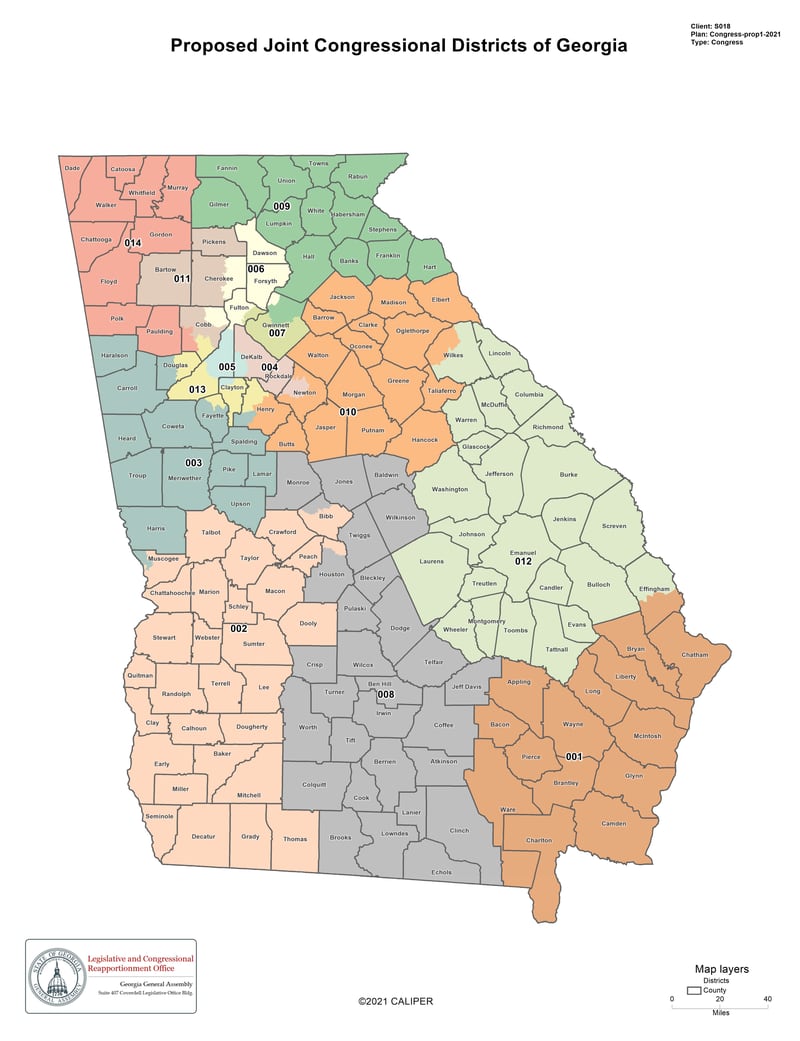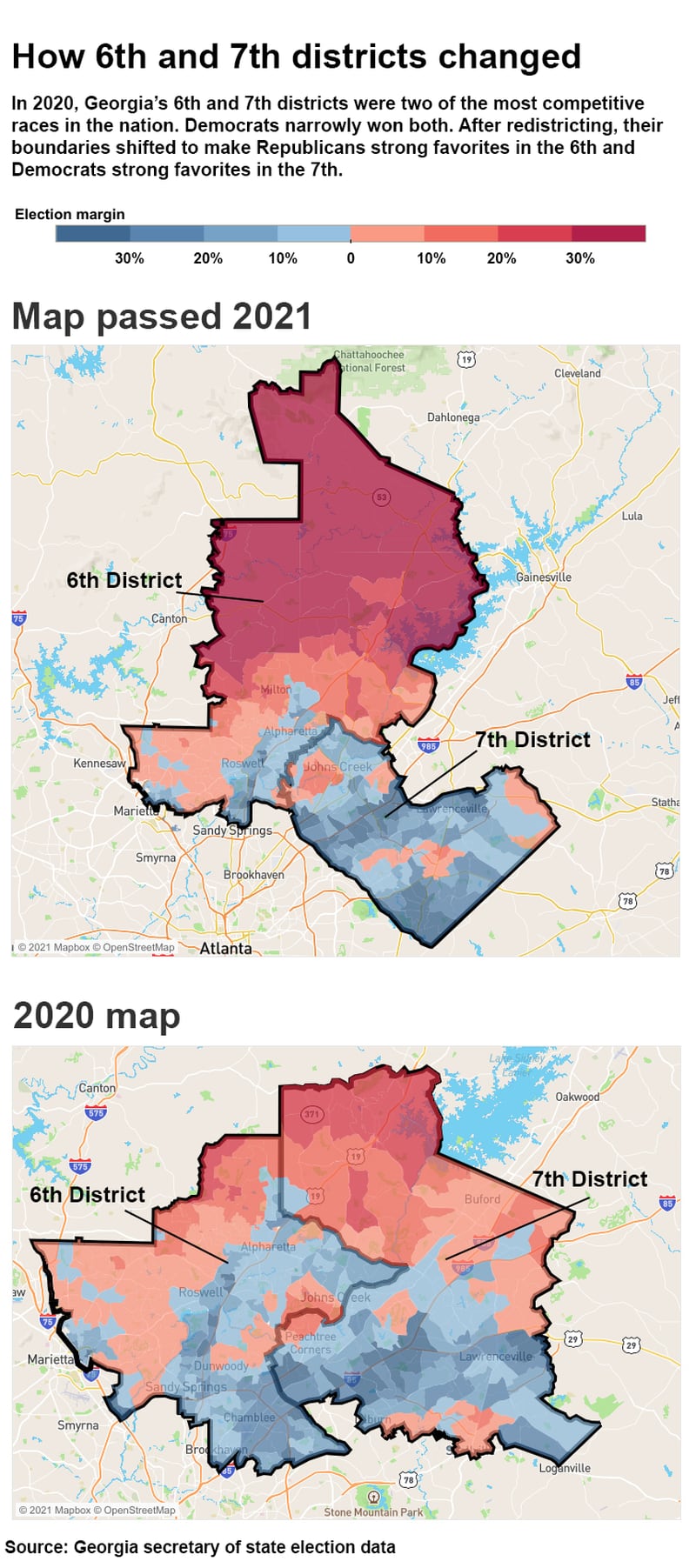A federal judge ruled Thursday that Georgia’s district lines must be redrawn to ensure adequate representation of Black voters in Congress and the General Assembly, finding that the state’s maps illegally weakened their political power.
The decision could result in the election of additional Black representatives next year, with Democrats hoping to gain a seat in the U.S. House, where Republicans currently hold a 222-212 majority and control nine of 14 Georgia congressional seats. Before the General Assembly’s 2021 redistricting, the GOP held an 8-6 advantage in Georgia.
U.S. District Judge Steve Jones concluded that the Republican-controlled General Assembly violated the Voting Rights Act of 1965, which prohibits racial discrimination in elections.
Jones’ order requires legislators to create an additional majority-Black congressional district in west metro Atlanta by Dec. 8. His ruling also calls for two more state Senate districts and five more state House districts with Black majorities in the Atlanta and Macon areas.
Hours after the ruling, Gov. Brian Kemp ordered a Nov. 29 special session for lawmakers to return to Atlanta and redraw the state’s political districts.
“Georgia has made great strides since 1965 towards equality in voting,” Jones wrote in his 516-page order. “However, the evidence before this court shows that Georgia has not reached the point where the political process has equal openness and equal opportunity for everyone.”
U.S. Rep. Nikema Williams, chairwoman of the the Georgia Democratic Party, called Thursday’s ruling a “resounding victory” for democracy.
“Republicans knew they couldn’t win on their ideas, so they resorted to redrawing the maps in their favor instead,” she said.
Josh McKoon, chairman of the Georgia Republican Party, called Jones a “partisan Democrat ally.” Jones was appointed to the U.S. District Court for the Northern District of Georgia in 2011 by then-President Barack Obama.
“It is simply outrageous that one far-left federal judge is invalidating the will of the elected representatives of the people of Georgia who drew fair maps in conformity with long-standing legal principles,” he said.
Credit: Special
Credit: Special
Black voters in Georgia accounted for nearly half of the state’s sharp population growth — over 1 million new residents during the past decade — but state legislators shaped districts in a way that resulted in Democrats losing a seat in Congress during last year’s elections. Black voters overwhelmingly support Democrats while most white voters back Republicans.
Bishop Reginald T. Jackson, who leads more than 500 African Methodist Episcopal churches in Georgia and was a witness in the redistricting trial, said Thursday’s order was a “long march to justice.” His organization, the Sixth District of the A.M.E. Church, was a plaintiff in the lawsuit.
“It is unfortunate that, decades after the civil rights movement, we still need to defend and promote the right for the African American community to vote. (But) make no mistake that we will continue to fight for these causes, not only because the facts and the law are on our side, but because democracy is our country’s most important tenet and is always worth fighting for,” Jackson said.
Georgia is likely to appeal the ruling, but the U.S. Supreme Court upheld the Voting Rights Act in June, and a federal court picked a new congressional map for Alabama this month that adds a second district where Black voters form a substantial portion of the electorate.
Attorneys for Georgia argued during an eight-day redistricting trial last month that the state’s political maps are based on partisanship rather than race, saying Republicans created districts that benefit their party but didn’t discriminate against Black voters.
But plaintiffs in the case, including civil rights organizations and religious groups, said the Republican-controlled General Assembly denied opportunities for Black voters during redistricting two years ago.
During that redistricting, the General Assembly shifted the boundaries of the 6th Congressional District, which was previously held by U.S. Rep. Lucy McBath, a Black woman from Cobb County.
Credit: Isaac Sabetai
Credit: Isaac Sabetai
The new district included heavily Republican and white areas to the north, resulting in Republican Rich McCormick winning the seat in last year’s election with 62% of the vote. McBath ran and won in the neighboring 7th District, ousting her Democratic colleague in the U.S. House, Carolyn Bourdeaux.
Senate Republican Caucus leadership expressed disappointment in the ruling.
“The majority party went to great lengths to draw maps that were legal, fair, compact and kept communities of interest together,” Senate GOP leadership said. “Obviously, we strongly disagree with the ruling and expect that all legal options will be explored to maintain the maps as passed by the Legislature.”
Even before the ruling, Democrats in Atlanta’s suburbs began maneuvering to run for solid-Republican seats in anticipation of Jones’ decision.
White Republicans now hold nine of Georgia’s 14 U.S. House seats, a larger share than white residents’ 50% of the state’s population. Black Democrats control five seats while Black residents account for one-third of the state’s residents.
The Republican majority also used redistricting to safeguard its control of the General Assembly. Republicans hold a 33-23 lead in the state Senate and have a 102-78 advantage in the state House.
The General Assembly will have the first opportunity to create a state map that complies with the judge’s order during the special legislative session.
Senate Majority Leader Steve Gooch, a Republican from Dahlonega, said it’s likely that many congressional, state House and state Senate districts will have to be redrawn across Georgia when legislators return to the state Capitol in the coming weeks.
”It’s unfortunate that we have to go back in, but we will comply with the laws of the land and govern accordingly,” Gooch said.
Senate Minority Leader Gloria Butler, a Democrat from Stone Mountain, praised the judge’s order, saying it will ensure Georgia complies with the protections of the Voting Rights Act.
“We are eager to help pass fairer maps that comply with federal law,” Butler said.
If state legislators fail to comply with the requirement for additional majority-Black districts, the courts would take over the redistricting process, as they did in Alabama.
“The court will not allow another election cycle on redistricting plans that the court has determined on a full trial record to be unlawful,” Jones wrote.
Redistricting battles are also playing out in courts across the country, including in the Southern states of Louisiana, North Carolina and South Carolina.










